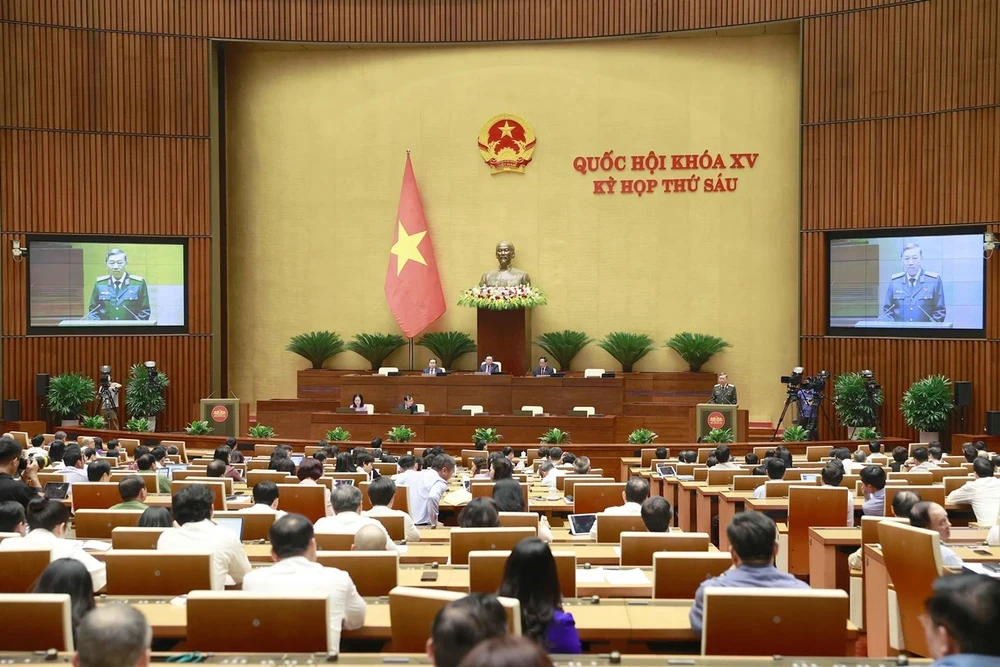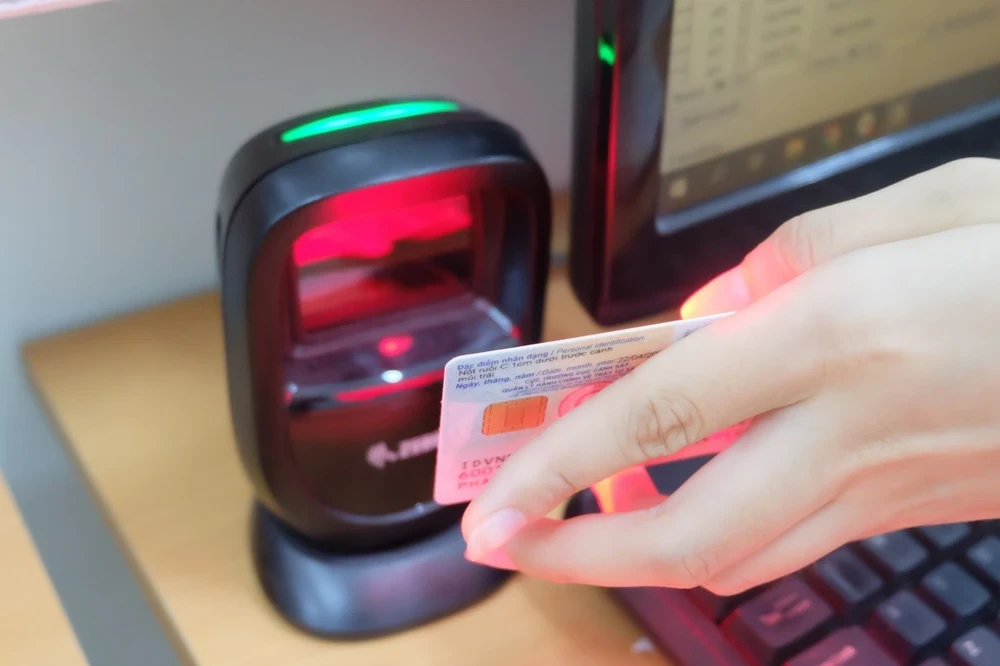Effective from July 1, 2024, the Law on Identification with many specific regulations on identification, electronic identification... aims at digital government, digital economy, digital society and better serves people and businesses.

At the recent 6th Session, the National Assembly passed the Law on Identification, changing the name of the citizen identification card to "identification card."
Effective from July 1, 2024, the law with many specific provisions on identification, electronic identification for citizens... helps to perfect the law, meet the practical requirements of population management, administrative reform, ensure human rights, citizen rights, towards digital government, digital economy, digital society and better serve people and businesses.
Fully guarantee human rights and civil rights
Regarding the reason for changing the law's name to the Law on Identification, according to the Ministry of Public Security (the agency drafting the draft law), this adjustment is consistent with the trend of our country's deep integration with the world, because some countries in the world also have a short name called identification without adding the word citizen.
Along with that, this adjustment also creates more favorable conditions for Vietnam in population management, expanding the subjects for cases of "Citizens of Vietnamese origin living in Vietnam but without nationality."
The Ministry of Public Security said that using the name of the law as "Identification Law" ensures full reflection of the amended and supplemented policies in this draft law.
At the same time, the true meaning of identity management is to identify and clearly define the identity of each specific person, distinguishing one individual from another; meeting the requirements of identity management in our country at the present stage is to manage the entire society, all people living in Vietnam; ensuring human rights and civil rights according to the provisions of law.
The omission of the word "citizen" from the law's name does not affect national sovereignty, nationality issues, or the legal status of citizens.

The content of the Law on Identification has stipulated a distinction between the issuance of identification cards to Vietnamese citizens and the issuance of identification certificates to those who do not have full rights as Vietnamese citizens.
The renaming of the Law on Citizen Identification to the Law on Identification was also based on the addition of subjects granted identity cards and subjects granted identity certificates who are Vietnamese origin living in Vietnam but whose nationality has not been determined.
This is a historical issue that has existed for a long time in our country. Up to now, there has not been any legal document that fundamentally and completely resolves this issue.
Currently, there are approximately 31,000 people of Vietnamese origin whose nationality has not been determined, including nearly 800 cases of mixed-race children between Vietnamese citizens and foreigners whose nationality has not been determined, and more than 11,000 cases whose nationality has not been determined.
This reality causes many difficulties in management of these cases, especially in ensuring security and order.
When giving his opinion on the draft law, Minister of Public Security To Lam said that the Identity Law will help "leave no one behind." Therefore, the goal and significance of protecting people's rights is very great.
Regarding the issuance of identity certificates to people of Vietnamese origin residing in Vietnam but without citizenship, Minister To Lam said that they must be recognized by society and have the right to conduct transactions in society.
The name of the Law on Identification is more accurate and comprehensive than the old name. The name of the Law on Identification is revised to expand the scope of subjects, better serving social management.
In addition, the law supplements regulations on the management and issuance of ID cards for people under 14 years old. Regulations on the issuance of ID cards for people under 14 years old will contribute to reducing paperwork and administrative procedures, promoting the value of exploiting and using the National Population Database, the ID Database and the utility of ID cards and electronic identification accounts; especially in verifying personal information; performing statistics, analysis, forecasting, and establishing digital population maps; reducing costs in implementing digital transformation; ensuring the legitimate rights and interests of people participating in civil transactions, especially essential transactions serving life.
Safety, security and information integration
In fact, with the application of the most advanced technological achievements in the world, the birth of Vietnam's electronic chip-based ID card along with electronic identification not only helps to strongly promote the transformation of human management methods from manual to modern, but also fully and strictly ensures security and safety factors and has the ability to secure information at a very high level.
Using chip-embedded ID cards can prevent counterfeit documents, reduce costs when notarizing traditional documents, and facilitate citizens when performing online public services.
The chip attached to the ID card has a very high level of safety and security, and biometric matching can be performed directly on the chip, so the citizen's identification information stored on the card cannot be changed, minimizing forgery.
In particular, this electronic chip does not have the ability to locate, information stored on the chip requires specialized tools to read and the information is encrypted.
At the discussion session on the draft Law on Identification at the 6th Session of the 15th National Assembly, Minister of Public Security To Lam affirmed: "The use of identification cards with electronic chips and QR codes, electronic identification cards are not monitored and cannot be monitored. The Ministry of Public Security as well as any agency are not allowed and cannot do this; at the same time, we are responsible for ensuring security and safety for citizens - those who use the cards are not monitored by any agency."
In addition, compared to the 2014 Citizen Identification Law, information on hometown and fingerprints has been removed and does not need to be shown on the ID card. Instead, the citizen's hometown will be integrated into the National Population Database.
According to the law drafting agency, removing fingerprints from the card surface ensures security during card use; removing hometown information ensures privacy, limits the need to issue new cards, and reduces difficulties in verifying information.

The advantage of the new ID card is that it integrates more citizen information on the card than the previous barcode ID card.
When people go through administrative procedures or other transactions, they only need to bring their chip-embedded citizen identification cards. This is a great effort of our Party and State on the journey to build a National Population Database - the "heart" of digital transformation.
According to Major General Pham Cong Nguyen, Director of the Department of Legislation and Administrative and Judicial Reform - Ministry of Public Security, currently citizens have many different types of identification documents, causing certain difficulties in storage and use, especially in performing administrative procedures and public services, which are not suitable for the trend of digital transformation and application of information technology in social activities; citizen information in the national population database and citizen identification database only includes a few groups of information, causing difficulties in implementing national digital transformation...
Those limitations are overcome in the Law on Identification, specifically: Supplementing and adjusting regulations on the rights and obligations of people of Vietnamese origin, protecting personal data, and citizens' rights related to electronic identification more fully and strictly...
The Law on Identification was passed to help resolve administrative procedures and provide online public services, serve socio-economic development, serve digital citizens, perfect the ecosystem, serve connection, exploitation, supplement and enrich population data and effectively serve the direction and administration of leaders at all levels.
To facilitate people after the Law on Identification was passed by the National Assembly, Article 46 of the Law on Identification stipulated that legal documents issued using information from identity cards and citizen identification cards will retain their validity.
State agencies are not allowed to request citizens to change or adjust information on their identity cards or citizen identification cards in issued documents.
Citizen identification cards and identity cards that expire from January 15, 2024 to before June 30, 2024 will continue to be valid until June 30, 2024.
The National Assembly's approval of the Law on Identification at the 6th Session of the 15th National Assembly is a breakthrough in innovating population management, ensuring human rights and citizen rights, enhancing the application of science and technology, improving the efficiency and value of the National Population Database and identification cards in State management, in line with the trend of digital society management.
According to VNA